The Secret World preview
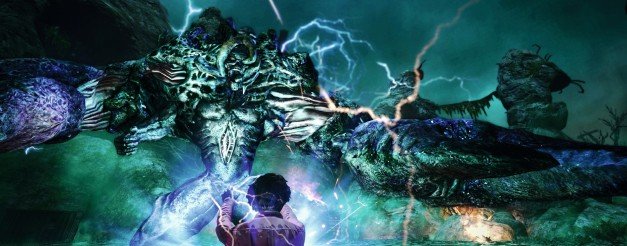
The Secret World is set in a contemporary realm where every myth, every legend, every so-batshitmental- you-accusemice- of-spying-on-you conspiracy theory is true. It's moody, it's dangerous, it's dark. Any elves that might live there will have sharp little teeth and drag your firstborn off to the woods if you turn your back. It doesn't look like other MMOs.
So my first question to Ragnar Tørnquist, the game's creative director: is it like other MMOs? Playing as a member of the corporate Illuminati, the secretive Templars, or the eastern Dragon, will I be killing ten vampires and taking their vampire skins back to a man who wants to make a big pale sack?
“No. It's 11 vampires. That's our formula: it's plus one.” A short pause, then he chuckles. “We're an MMO, and we're not ashamed of that. There's a lot for players to do: both in terms of traditional MMO mechanics, and in terms of new and exciting stuff that hasn't really been done before.”
Most obvious is the lack of both levels and classes in the game. Instead, players earn points that can be plugged into skills – closer to EVE's time-dependent research tree than WoW's uphill crawl. Points are earned by “killing monsters, doing missions, gathering lore, crafting, PvP, just generally playing the game.” The cost of each skill varies depending on its position on a skill wheel – the total mastery of blood magic obviously costs more than the ability to fire a standard pistol.
Funcom want players to have freedom over their character creation. I ask Ragnar who he usually plays as during his sessions with the game. He starts off reticent.
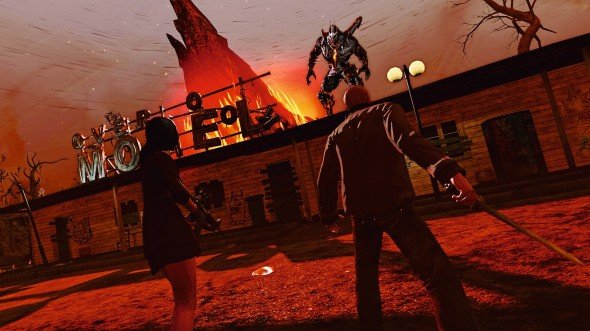
“I like blowing shit up. So I really like playing with the shotgun or the assault rifle. Ooh, or grenades! I, uhh… like the sound the gun makes.” There's a sheepish giggle, and I notice him near-audibly click into the world he's helped create. “I like to kill vampires with a shotgun or an assault rifle, but some of the cooler powers I've seen so far belong to Blood Magic. It's very occult, very oldfashioned magic that has a lot of really cool effects.”
Without set classes, players instead choose a 'deck' of skills – seven active and seven passive – that can be switched out depending on the job at hand. “It's really easy to switch decks. We also have something called a Base Gear Manager, which basically allows you to create this prefab deck, a combination of weapons and equipment so you can switch really quickly.” Funcom's playtests have shown that some people – Ragnar terms them 'power-players' – switch decks at every logical opportunity to get the kind of deliciously nerdy stat boost that makes us all sigh contentedly, whereas others are content to stick with their favourite skillset. Funcom are keen to make sure both approaches work – though points sunk into a skill-line you later come to shun can't be won back.
The biggest gaming news, reviews and hardware deals
Keep up to date with the most important stories and the best deals, as picked by the PC Gamer team.
But this classless, level-less MMO won't be ditching all the genre's trappings. Ragnar still expects the RPG holy trinity – healer, tank, damage-dealer – to work in combat scenarios. “Some players will definitely fall into the pre-prescribed roles. You can play the game like that, but we're also creating very specific encounters where players have to think a little bit outside the box: where they're going to have to bring two weapons on their character, they're going to have to blend play styles a little bit.”
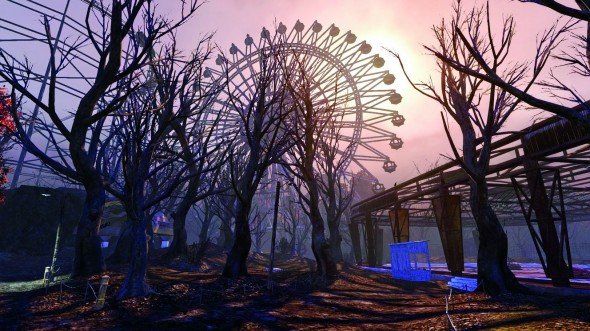
The game caters for groups of up to five, but doesn't rely as heavily on instances as its peers. “Most of our world is completely open, and live and massively multiplayer. There's a mission called Elm Street Blues – an assault on a police station. The siren goes off, and you basically get tasked with holding off this attack. The beauty of it is that when the siren goes off, everybody in that location hears it. People can just flock to you, and you'll all get credit for that.”
More standard quests fill out your journal – each player having a story, main, and secondary job at one given point. The Secret World's quests are known as 'missions' to better fit the game's contemporary aesthetic, and Ragnar sees them as different animals to their MMO peers' questy counterparts. “In a lot of MMOs, quests are there in order to feed the level treadmill. The Secret World's missions are about rewards, XP and progression – but they're also about the storytelling and the characters. Our missions are longer and more involved than the quests in most other games.”
Missions are split by type. Action missions are closest to standard quest models, but involve tasks such as “infiltrating a building, or setting off a bomb”. Sabotage missions will have you using “secret agent-type game mechanics” that I hope involve gluing some kind of fake moustache to your face and speaking in a bad French accent. Even more intriguing are The Secret World's 'investigation' missions – described as “the most interesting” in Ragnar's opinion.
“They're the most different from everything else out there,” he says. “Investigation missions are about solving puzzles and digging deeper into the mysteries of the world.” Wait a second, puzzles? In my MMO? Kill ten puzzles? Pick up a puzzle and take it to the village elder? I'm confused. Ragnar helpfully clarifies. “We're not trying to create arbitrary puzzles in a world: presenting you with sliding blocks or something.”
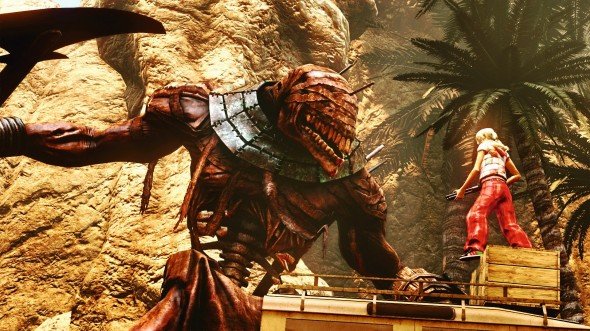
Ragnar's gaming background (he worked on both The Longest Journey and Dreamfall before The Secret World) bubbles up as he's explaining the concept behind these fresh puzzley interludes. He refers to the investigation missions as having an 'adventure feel', and namechecks The Longest Journey as the closest touchstone for comparison. “It's about really digging into the mysteries and using knowledge of either the real or fictional Secret World in order to solve something.”
That conjures up images of halting your raids to Alt+Tab over to Wikipedia, before ducking back into the game. Won't that make play sessions stilted? Ragnar says otherwise. “Some players, they'll immediately want to go out of the game and start investigating. Other players might just say, 'I'm going to wait for this and jump into another mission in the meantime.' Our missions are checkpointed, so you can put them on hold.”
At a structural level, Funcom are currently toying with the idea of including an in-game browser. However, Ragnar argues that even by minimising The Secret World in your start bar, you won't be truly leaving the universe it weaves – because it is our world. “It's not like jumping from a straight fantasy world back into the reality of Google. You're going from a place where everybody has web browsers to another place that's exactly the same. And you might have to talk on forums, you might have to do some research, you might have to learn a little about, say, ancient Rome in order to progress”
But MMOs aren't known for their mystery. With thousands of players a week cycling through the same quests, bosses, and instances and the backup of reams of online content – wikis, forums, and FAQs – how will Funcom keep their puzzles puzzling? Ragnar doesn't foresee it as a problem. “We're going to be patching up new content later, but of course, in the long run people are going to solve everything. But depending on what kind of player you are, you might want to try your hand at it yourself, you might call out in one of the in-game channels for some clues, or you might go outside the game to look on the wiki. That's part of the joy: to be able to go into The Secret World and see this world where these mysteries are being cracked by hundreds of players, and see forums alive with theories.”
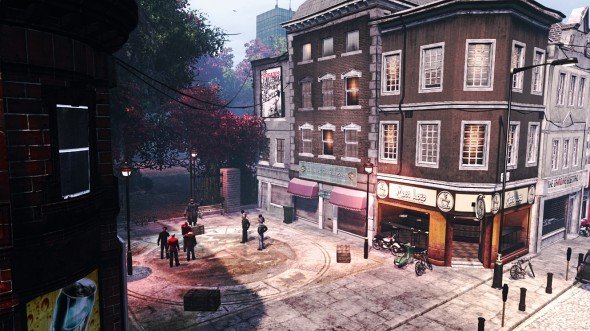
I want to get the jump on those forumites, so I ask Ragnar to describe his favourite missions. “So you want spoilers, then?”, he asks. I'm about to explain that, technically, I'm just acting out his message of extracurricular research, before he barrels happily into the overview.
“One has a fortune teller that's been having visions of the tip of a pyramid. This is an investigation mission that is very much about the in-game stuff, and it asks the player to figure out where she's talking about. In this specific case there's a place called Pyramid Point. The player can look at the map and figure that out.” Ragnar pauses.
“There's another one set in the town of Kingsmouth in Maine. A priest puts the player on the track of symbols through the game world. They'll find them on the manholes on the street, but as they progress through that they get to a puzzle that involves the name of a painter. They can get that through Wikipedia, or another online resource.”
Funcom are making their own online resources, letting the Secret World bleed further into our own. Kingsmouth.com already exists, a tourist site for the sleepy fishing village that belies the Lovecraftian sinisterness lurking just under the surface. No doubt it will be scoured for clues come launch, but Ragnar says it won't be the only site. “We'll make other websites that look normal – but players might have to hack into them some way, or find a password.”
Ragnar admits there was a danger in The Secret World. Taking on a remit that boils down to “what if everything ever were true?” is a Herculean task. “I think the first few years working on this game, I saw too much, I dug too deep. I can't unsee a lot of the stuff I've seen.” But when he talks about his Secret World, his enthusiasm pulls the listener in with him. “There are mysteries still, it's not like we've found everything. There are still deep and dangerous forests. It's human nature to be intrigued by that.” The Secret World wants to plunge you into those murky woods – and it's a similarly intriguing proposal.

